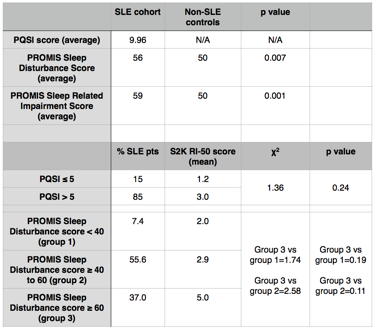Session Information
Date: Sunday, November 8, 2015
Title: Systemic Lupus Erythematosus - Clinical Aspects and Treatment Poster Session I
Session Type: ACR Poster Session A
Session Time: 9:00AM-11:00AM
Background/Purpose: Sleep disturbances occur in many autoimmune diseases and are
ranked highly as an unmet need in patients with SLE. We hypothesized that poor
sleep increased SLE disease activity and decreased quality of life (QoL). The aims of this pilot study was to describe in SLE
patients: 1) the prevalence of sleep problems, 2) evaluate the impact of sleep
problems on quality of life (QoL), and 3) compare
sleep problems with disease activity.
Methods: 27 patients with a confirmed diagnosis of SLE according
to the 1997 ACR classification criteria for SLE or the SLICC classification criteria
for SLE were enrolled in this cross-sectional study. Comorbid conditions were
identified by patient’s clinic intake assessment and review of electronic
medical records. Patients completed three sleep surveys at the enrollment
visit: Pittsburgh Sleep Quality Index (PSQI), Patient Reported Outcomes
Measurement Instrument System (PROMIS) short form for Sleep Disturbance, and
PROMIS short form for Sleep Related Impairment. Disease activity assessed using
SLEDAI2K Responder Index-50 (S2K RI-50). Lupus Impact Tracker (LIT) evaluated
patient reported QoL. Student’s t-test compared means
from independent samples, ANOVA compared categorical variables with normally distributed
continuous variables, and Kruskal Wallis compared
categorical variables with non-normally distributed continuous variables.
Results: 1) Prevalence of sleep problems in patients with SLE was 85%
as defined by PQSI score > 5 (Table 1). SLE patients experience greater
sleep disturbance and sleep impairment as measured by the PROMIS surveys when
compared to the general population. 2) SLE QoL was significantly
higher in patients with good sleep. 3) Increased S2K RI-50 scores were observed
in patients with poor sleep, though results did not reach statistical
significance.
Conclusion: There is a higher prevalence of poor sleep quality among
patients with SLE and this was shown to strongly associated with patient
reported QoL. Higher SLE disease activity was seen in
patients with poor sleep, though directionality of this association is unable
to be determined in this small, cross-sectional study. Longitudinal studies with
actigraphy are currently underway to further examine
this relationship.
Table 1
To cite this abstract in AMA style:
Hinze A, Chu P, Thekkemuriyil D, Ju YE, Sen D, Eisen S, Kim A. Systemic Lupus Erythematosus and the Evaluation of Poor Sleep: The Sleeps Pilot Study [abstract]. Arthritis Rheumatol. 2015; 67 (suppl 10). https://acrabstracts.org/abstract/systemic-lupus-erythematosus-and-the-evaluation-of-poor-sleep-the-sleeps-pilot-study/. Accessed .« Back to 2015 ACR/ARHP Annual Meeting
ACR Meeting Abstracts - https://acrabstracts.org/abstract/systemic-lupus-erythematosus-and-the-evaluation-of-poor-sleep-the-sleeps-pilot-study/

